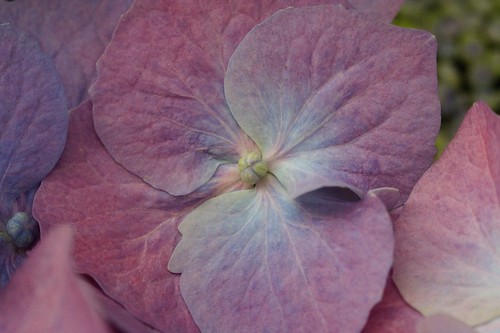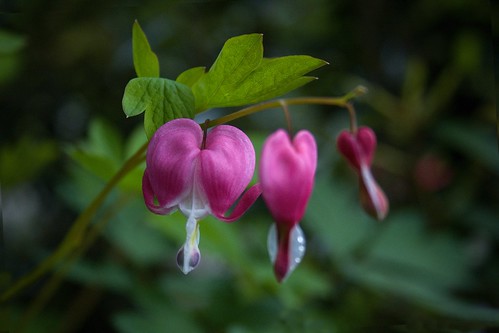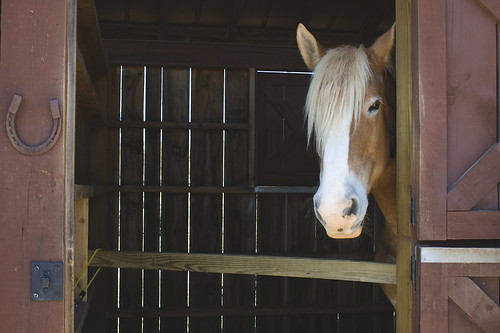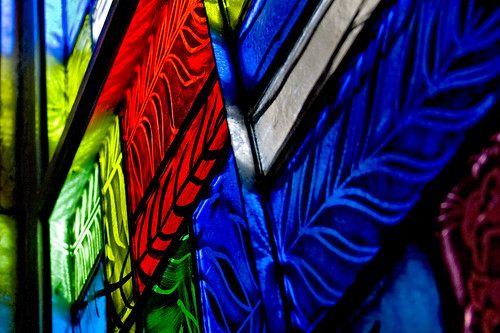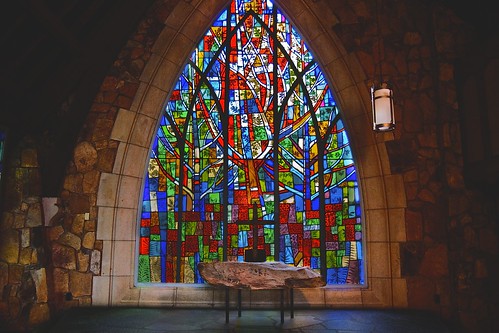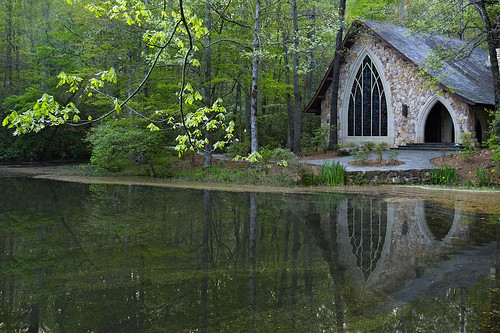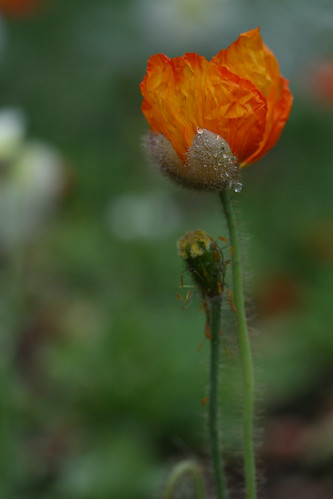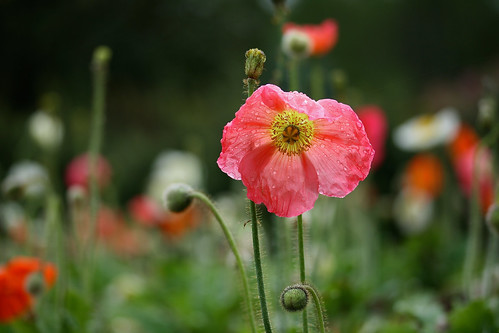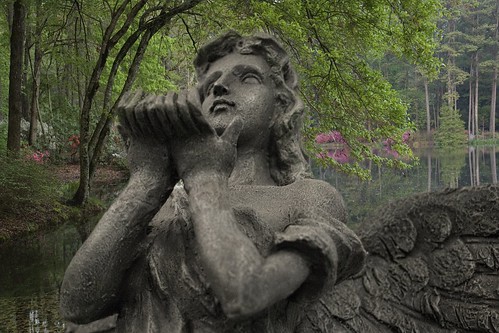Monday, April 30
song is existence
Song, as you teach it, is not desire,
not the urge for a final slender achievement;
Song is existence. The god sings with ease.
When, though, will we exist? And when will he turn
the earth and the stars in our direction?
You do not love this, oh youth, although
your voice bursts open your lips—learn
to forget that you once sang out. It passes.
To sing in the truth is a different order of breath.
An order around nothing. A moan in the god. A wind.
-- Rainer Maria Rilke The Sonnets to Orpheus
Translated by Norbert Ruebsaat
Posted by
rb
at
4/30/2007
![]()
Sunday, April 29
Saturday, April 28
to be like Orpheus
To be like Orpheus, who could talk
with animals in their own language:
in sleep I had that art, but now
I've walked into the separate
wilderness of age,
where the old libidinous beasts
assume familiar shapes,
pretending to be tamed.
-- Stanley Kunitz, from "Raccoon Journal" in The Wild Braid
Posted by
rb
at
4/28/2007
![]()
Thursday, April 26
new forms
One learns to accept the fact that no permanent return is possible to an old form of relationship; and more deeply still, that there is no holding of a relationship to a single form. This is not tragedy but part of the ever-recurrent miracle of life and growth. All living relationships are in process of change, of expansion, and must perpetually be building themselves new forms.
-- Anne Morrow Lindbergh Gift from the Sea
Posted by
rb
at
4/26/2007
![]()
Monday, April 23
footbridge
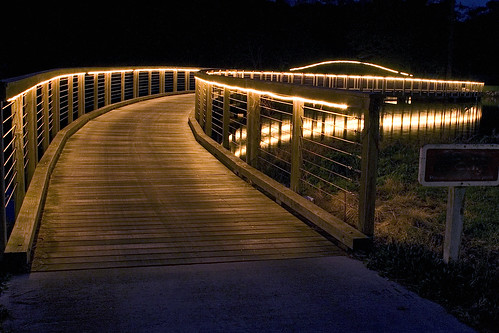
view larger
This image of light is dedicated to Charles Needle and to Mark S. Johnson, who cheerfully walked with me in the dark, patiently taught me about exposure, and, when I faltered, encouraged me to snap the shutter.
Charles Needle Photography
Mark S. Johnson Photography
Posted by
rb
at
4/23/2007
![]()
Sunday, April 22
chapel 4

The small jewel-like chapel is the Ida Cason Callaway Memorial Chapel at Callaway Gardens in Pine Mountain, Georgia. It was planned by Cason Callaway as a tribute to his late mother. The stained glass windows were designed by Atlanta artist Joel Reeves.
Shown above is Alex Morley. An online gallery of some of his beautiful photographs can be viewed here.
Posted by
rb
at
4/22/2007
![]()
on dreams
And there is the dream of the pond, the only significant dream that originates in childhood, and also the only one that recurs from one year to another without the slightest change. And there is the dream of love, which it is pointless to burden with commentary since the only profound exegetes that this feeling has stirred until now are the organ and violoncello. These various dreams do not proceed, moreover, without concluding mutual alliances: the dreams of ambition, of love and death are frequently set within cathedrals, and the dream of the pond is also a dream of sacred terror. And there is the dream of melancholy happiness, recognizable in that it always unfolds beneath a certain rose sky, and the dream of absolute bliss, which I have dreamed but once, and where nothing transpires apart from an unforgettable blue color.
. . . The sleeper assembles images the way the poet assembles words: he makes use of them more or less felicitously to speak about himself to himself. Just as there are mutes, there are sleepers who do not dream; others dream badly, tritely, or by fits and starts: there are stuttering and verbose dreamers. Others, among whom it would be sheer ingratitude on my part not to count myself, sometimes receive the benefice of a beautiful dream, like those sorry poets whom chance occasionally grants the windfall of a verse that astonishes even them. Finally, there are perhaps sleepers of genius who dream with sublimity every night. If only we had at our disposal collections, museums of dreams, we could doubtlessly authenticate the existence of a Delacroix, a Leonardo da Vinci, or Watteau of the world of closed eyes.
-- Marguerite Yourcenar Dreams and Destinies
Translated by Donald Flanell Friedman
Marguerite Yourcenar
Posted by
rb
at
4/22/2007
![]()
Friday, April 20
toward a particular effect
To the progenitors of myth, all appeared real, both their symbols and the objects of their symbols. They well understood that their gods were symbolical names for forces, yet those symbols were functioning as a part of reality nonetheless. Hence the Greek, the Christian, the Hindu, and the Mesopotamian never made the attempt to produce the likeness of reality as an end in itself in their art. Although they used a great deal of material which appealed to visual memory in a slighter or greater degree, which varied with times and places, their objective was never to reproduce the particular attributes of visual mechanics. Their representation of the gods, even when they partook more and more human characteristics (which is a common progression of the arts of Greece and India at least), are never attempts to produce the appearance of a man, but rather a reference to the genre of man.
Here an example from mathematics may be helpful. The letter x in algebra is definitely an abstraction in relationship to the numbers with which it can intermingle as a factor. It is true that the numbers are also an abstraction, yet x is even a further abstraction from the qualities of the numbers. Yet this letter functions in all of the calculations as a real quantity. In other words, we have a symbol which admittedly represents the unknown. Yet our faith in the system is so great—that is, our faith in the absolute relationships of all quantities—that we can affirm this symbol of the unknown as a definite, real, and calculable element. We might say that the Greeks understood the quality of the unknown, but so great was their faith in order that the unknown, although always symbolized, functioned for them as a part of reality, and entered as a real attribute in all their real relationships. Now, the substitution of the letter x, or in fact, of any of the numerical quantities by real objects, would immediately remove the whole relationship from the sphere of generality and place it into the particular, for real objects would introduce a host of qualities which would impress themselves upon our attention and consequently confuse the absoluteness of our equations.
In this sense, the Greek never particularized the objects which he introduced as vehicles for the statement of the plastic equivalent of unity. All the objects are made impersonal, having definite functions as symbols both in appearance and in the portion which they play in the anecdote. All the relationships are therefore symbolic. This is made manifest in the figures represented, whose attitudes and relationships toward not only each other, but in relation to the cosmogonic forces which they symbolize, are symbolic; the meaning of the symbol itself being identical with the notion of reality which the artist is to symbolize or to make manifest plastically.
Now, in the world of the painter, his sense of the essential and the infinite must be realized plastically. He must express his notions of reality in the terms of shapes, space, colors, rhythms, and the other plastic elements which we have previously described, for they constitute the language of painting, just as sound, timbres, and measures constitute that of the musician, or words and sentences that of the linguist. Or rather, the painter must represent them by the means of colored shapes arranged in certain rhythms constituting certain ideated and controlled movements toward a particular effect, this effect or end being the subject of his picture.
-- Mark Rothko The Artist's Reality
Posted by
rb
at
4/20/2007
![]()
Thursday, April 19
like waves
How pale the light was at the window! But that was nice. The fire rose and fell on the wall. It was like waves. Someone had put coal on and he heard voices. They were talking. It was the noise of the waves. Or the waves were talking among themselves as they rose and fell.
He saw the sea of waves, long dark waves rising and falling . . .
-- James Joyce A Portrait of the Artist as a Young Man
Posted by
rb
at
4/19/2007
![]()
little houses
When we read the works of a great word dreamer like Michel Leiris (particularly in his Biffures), we find ourselves experiencing in words, on the inside of words, secret movements of our own. Like friendship, words sometimes swell, at the dreamer's will, in the loop of a syllable. While in other words, everything is calm, tight. Even as sober a man as Joseph Joubert recognizes the intimate repose of words when he speaks of certain ideas rather curiously as "huts." Words—I often imagine this—are little houses, each with its cellar and garret. Common-sense lives on the ground floor, always ready to engage in "foreign commerce," on the same level as the others, as the passers-by, who are never dreamers. To go upstairs in the word house, is to withdraw, step by step; while to go down to the cellar is to dream, it is losing oneself in the distant corridors of an obscure etymology, looking for treasures that cannot be found in words. To mount and descend in the words themselves—this is a poet's life. To mount too high or descend too low, is allowed in the case of poets, who bring earth and sky together.
-- Gaston Bachelard The Poetics of Space
Translated by Maria Jolas
Gaston Bachelard
Michel Leiris
Joseph Joubert
Posted by
rb
at
4/19/2007
![]()
Wednesday, April 18
the gentle vibration of things

moeder met kind by Paula Modersohn-Becker
I must learn how to express the gentle vibration of things, their roughened textures, their intricacies . . . the strange quality of expectation that hovers over muted things; I must try to get hold of the great and simple beauty of all that. In general, I must strive for the utmost simplicity united with the most intimate power of observation.
-- Paula Modersohn-Becker The Letters and Journals
Translated by Arthur S. Wensinger and Carole Clew Hoey
about Paula Modersohn-Becker
Posted by
rb
at
4/18/2007
![]()
Monday, April 16
Awakening Gatha
Waking in the morning
Time smiles in my hand.
This dawn
lasts all day.
-- Deena Metzger
Deena Metzger
Gathas
Posted by
rb
at
4/16/2007
![]()
there was a place
They clung together in that bright moment of wonder, there on the magic island, where the world was quiet, believing all they said. And who shall say—whatever disenchantment follows—that we ever forget magic, or that we can ever betray on this leaden earth the apple tree, the singing, and the gold? Far out beyond that timeless valley, a train, on the rails for the East, wailed back its ghostly cry: life, like a fume of painted smoke, a broken wrack of cloud, drifted away. Their world was a singing voice again: they were young and they could never die. This would endure.
He kissed her on her splendid eyes; he grew into her young maenad's body, his heart numbed deliciously against the pressure of her narrow breasts. She was as lithe and yielding to his sustaining hand as a a willow rod—she was bird-swift, more elusive in repose than the dancing water motes upon her face. He held her tightly lest she grow into the tree again, or be gone among the wood like smoke.
Come up into the hills, O my young love: return. O lost, and by the wind grieved, ghost, come back again, as first I knew you in the timeless valley, where we shall find ourselves anew, bedded on magic in the month of June. There was a place where all the sun went glistering in your hair, and from the hill we could have put a finger on a star. Where is the day that melted into one rich noise? Where is the music of your flesh, the rhyme of your teeth, the dainty languor of your legs, your small firm arms, your slender fingers, to be bitten like an apple, and the little cherry-teats of your white breasts? And where are all the tiny wires of fine-spun maidenhair? Quick are the mouths of earth, and quick the teeth that fed upon this loveliness. You who were made for music, will music hear no more: in your dark house the winds are silent. Ghost, ghost, come back from that marriage that we did not foresee, return not into life, but into magic, where we have never died, in the enchanted wood, where we lie still, strewn on the grass. Come up into the hills, O my young love: return. O lost, and by the wind grieved, ghost, come back again.
-- Thomas Wolfe O Lost (the original version of Look Homeward, Angel)
O Lost
Posted by
rb
at
4/16/2007
![]()
